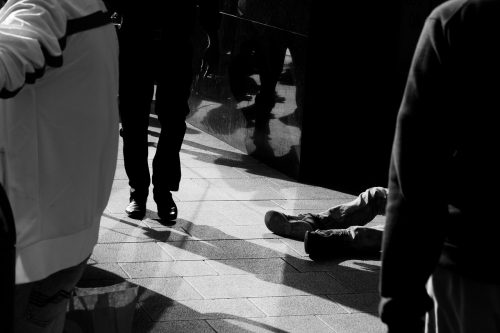Matthew’s gospel recounts one of Jesus’ parables about a landowner who hires workers at different times throughout the day—early in the morning, at 9:00 AM, Midday, 3:00 PM and 5:00 PM.
At the end of each day, he paid all the workers the same wage, regardless of how long they had worked. Those who worked the longest complained, but the landowner responded that he was being fair and generous, as they had all agreed on the wage.
Focus
The parable, often titled ‘The Parable of the Workers in the Vineyard,’ actually centres on the vineyard’s owner. It could be aptly named ‘The Parable of the Compassionate Employer.’ This man exemplifies incredible grace, compassion, and sensitivity for the unemployed. Though kind and generous, his actions are misunderstood, a common plight of the benevolent.
I think of the many times I’ve seen labourers on the roadside in developing countries. These men are desperate to work and don’t know from one day to the next whether they’ll be successful. Imagine the humiliation and uncertainty:
Will I get any work today?
Will I be able to feed my wife and kids?
Will I return home broke and ashamed to the hungry faces of my family?
Many of these blokes linger by the roadside, clinging to hope. In our tale, those who stick around are ultimately rewarded.
Courage
In the first century, labourers worked twelve hours, and the daily rate was a denarius. Today, a denarius would be worth about $60. Those employed at sunrise (6:00 AM) would work hard throughout the heat of the day, hoping they’d be hired for a second day or longer.
The landowner made four additional trips to the marketplace to reward the raw courage of those who remained hopeful for work. Most labourers would leave by noon, but these workers stayed eager and ready. They were not among those who gave up. Their courage in uncertainty is a testament to the human spirit. The owner doesn’t offer them charity; he’s interested in providing a hand-up, not a handout.
The Payout
By day’s end, there were five groups of workers. Only Group One had a verbal contract: “He agreed to pay them a denarius for the day and sent them into his vineyard.” Groups two, three, and four had a promise: “I will pay you whatever is right.” Group 5 was only offered work with no mention of pay.
When evening came, the vineyard owner told his foreman, ‘Call the workers and pay them their wages, beginning with the last ones hired and going on to the first.’
Why does the master instruct the foreman to pay the last first? Because if he’d done it the other way around, no one would have complained. Everyone would have been happy. So, why deliberately upset people? Read on …
Rising Anger
Imagine the increasing irritation of group one as people who had worked for only an hour or a few hours were paid a denarius. Group One hoped they’d be paid more, but they all received the same.
Jesus’ parable does not focus on equal pay for equal work. This story concerns the overpaid, not the underpaid—and no one is underpaid. Jesus told this parable to teach people about God’s amazing grace, which is resented by those who feel that they have earned their way to more.
The complaint from group one reveals the deep prejudice in their hearts: you have made them equal to us. Their words resonate with the same intensity as those of the older brother in the Parable of the Prodigal Son, who couldn’t stand the overwhelming grace bestowed by the loving father on his wayward son.
Judas showed a similar attitude when Mary anointed Jesus’ feet with expensive perfume. “Why this waste?” exclaimed Judas, the treasurer, the thief. Unfortunately, some people find grace infuriating, and those who have experienced it are often the worst at sharing it with others.
The Take-Home Truth
Jesus shared this parable to illustrate his statement, ‘But many who are first will be last, and many who are last will be first.’ In Jesus’ time, some viewed themselves as the first because they were respectable, pious, and spiritual. Then, Jesus came along and associated with tax collectors, sinners, and other ‘undesirables’ who had been ostracised from Israel’s religious community. He extended precisely the same level of grace to them, teaching that these people were equal to the in-crowd, a message that still resonates today.
Jesus extended precisely the same level of grace to them. His parable taught that these people were equal to the in-crowd, and the in-crowd didn’t like it.
Nothing’s Changed
Have you come across Christians like this? — good, Jesus-loving folks who find it overwhelming when the amazing grace they’ve received is also offered to those they consider unworthy. The same words resonate throughout two thousand years of church history: “You have made them equal to us.” And Jesus replies, “Yes, that’s right. I have.”
In God’s eyes, everyone IS equal to you – get used to it!
As we in Australia watch from a distance as people’s equal rights are wound back in the USA, we wonder if this could also happen here. The answer is yes. Already, years of work towards racial and gender equality have been wound back. Equality is under attack for people of colour, women, gay and transgender people, prisoners, and immigrants. The next four years could be simply awful for people in these and other minority groups.
Christlike?
What also concerns me is seeing and hearing fellow Christians cheering this on. Sometimes, I wonder if we follow a different Jesus or read the same gospels.
Let’s be clear: we lose nothing when others are made equal to us. We don’t surrender our rights and privileges—we share them. In Jesus’ parable, those who worked all day didn’t miss out—they received everything promised, and justice was served. The Compassionate Employer enabled each man to provide for his family and make them proud. He instilled self-worth in them, while those who worked all day sought to deny these blessings. They were greedy, wanting more for themselves and didn’t care for others.
I encourage you to support the equality of others, advocate for those on the margins, and include those who are often overlooked, even in our churches. This is not only a moral duty but also a call to action.
Several years ago, Bayside Church developed an inclusion statement, our firm commitment to upholding the dignity, honour, and equality of all people. If you’re looking for a church with these values, I invite you to join us on the journey.






